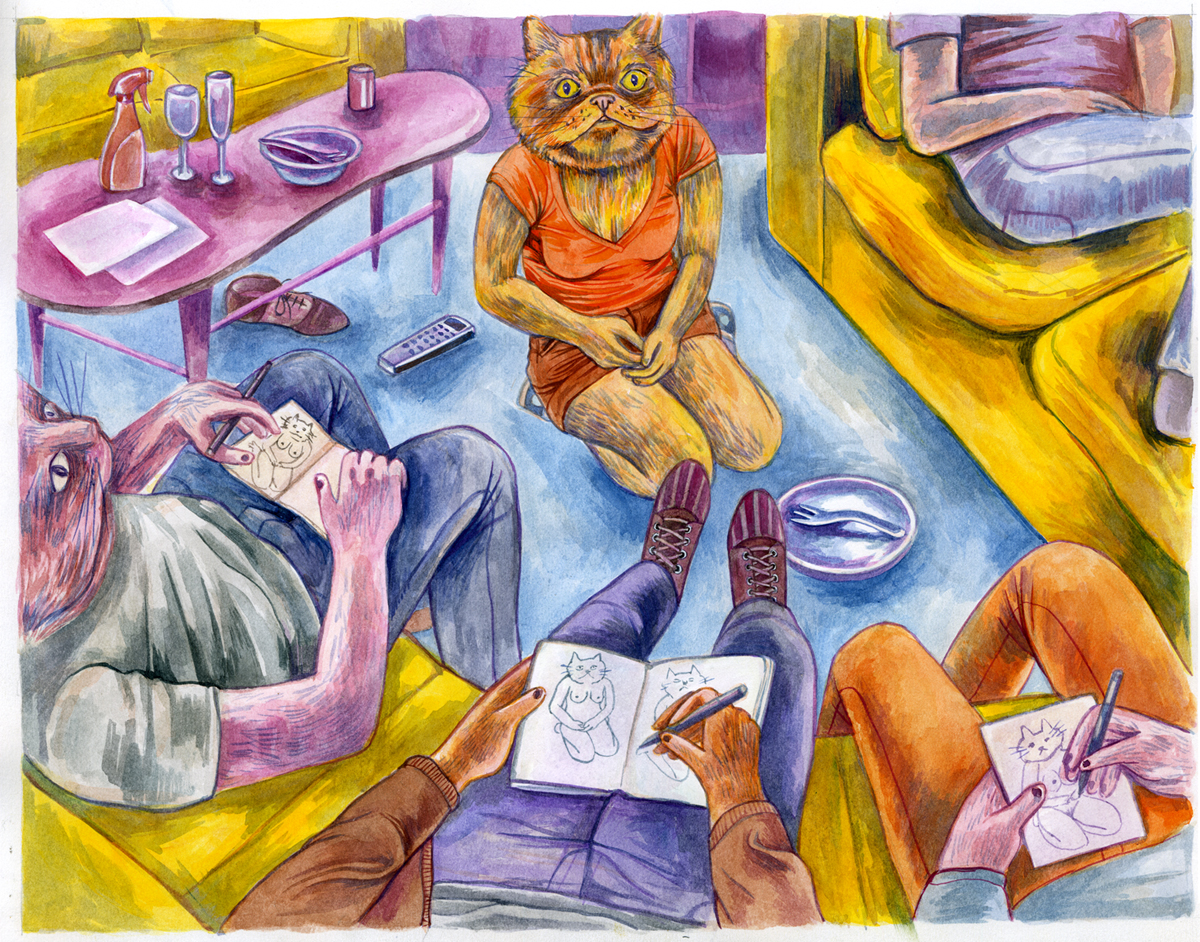Claire Messud is most recently the author of The Woman Upstairs. She previously appeared on The Bat Segundo Show #86.
Listen: Play in new window | Download
Author: Claire Messud
Subjects Discussed: How living in a surveillance state will affect contemporary fiction, the disappearing interior life, Sabbath’s Theater, proper norms and sentences that are alive, transgressions in fiction, girls who get up early to put on makeup, This American Life‘s climate change program, climatologists vs. novelists, the downside of promoting individual agency, why social novels are associated with “big books” and how “small books” can be just as big, James Joyce, reading Finnegans Wake, Ulysses references in The Woman Upstairs, A Doll’s House, how literary and ontological snippets float within your head throughout your life, Nora’s evolution, having to contend with the narrative in your head, people who are against universal health care, when interior selves set themselves up for disappointment, the fury guiding the first chapter, cultural osmosis, the glibness of assigning invisibility to a class of people, “The Ballad of Lucy Jordan” (Dr. Hook version and Marianne Faithfull version) Shel Silverstein’s songwriting career, not looking for original points or antecedents with family and culture, the “being wrong” speech in American Pastoral, Teju Cole’s Open City, always being a hero in your own story, peregrinations of memory, Chekhov’s “The Black Monk,” why investigation into the mind inevitably leads to the corporeal, interpretive liberation, being profoundly disembodied, Nora and foreign voices, multiculturalism and inverted xenophobia, Pierre Nora’s interpretation of the Pieds-Noirs, living a life somewhere between desperation and wanting to count, fakery and personas, giving other people what they want, how the semi-autistic genius myth has become defined by gender roles, Temple Grandin, the Google People in San Francisco, the Publishers Weekly controversy, Enlightened, Roxana Robinson’s Sparta, the unlikable character debate, why America is presently frightened by unlikable characters in art, why likability is uninteresting, +1 culture, how authors are held hostage by Goodreads reviews, the limitations of literature as escapism, how social media is regulated in the Wood-Messud household, and attempts to find a verb which adequately appreciates a difficult work of art.
EXCERPT FROM SHOW:
Correspondent: I don’t want to get into the ending of The Woman Upstairs, but it would appear that recent events — certain reports by Glenn Greenwald — would have the rare notion of reinforcing your ending in terms of what privacy means. And I wanted to start off this conversation because I have to address it in some way. Now that we are aware that we are living in a surveillance state, do you think this is going to do anything for contemporary fiction? Is America going to produce its share of Kunderas and Dostoevskys? I was wondering if you had any thoughts on this.
Messud: That’s an interesting question and I don’t necessarily have an answer. But one of the things that I was thinking about when writing this book — well, I was setting out to write somebody’s interior life. And the interior life is fast disappearing. The interior life was always invisible. But now, in the highly mediated world that we live in, nothing exists unless it is manifest. My daughter photographs her breakfast and puts it on Instagram. And by the same token, maybe there’s something satisfying. I mean, where’s the line between our own willful destruction of privacy and the intrusion of government agencies or whatever into our privacy? They meet somewhere in the middle, right?
Correspondent: You’ve just given me a very terrible idea. That PRISM exists to reproduce the interior monologue. That there will be some new version of Ulysses that is generated entirely by NSA wiretapping. I mean, it could happen! It seems crazy.
Messud: One of the things I’ve been thinking too — you know, we were talking earlier about the somewhat parlous state of literary life. I think it is both a great thing and a terrible thing, but literature may just become samizdat. It may become the underground form of communication. That one’s beneath the other forms of mediated communication.
Correspondent: Aha! So in other words, by going ahead and focusing on the interior through ornate, detailed, subtle sentences that convey several meanings, we are in some way revolting against this.
Messud: Yes. I believe it.
Correspondent: Okay. Well, you know, with that in mind, I’m going to have to bring up your epigraph. “Fuck the laudable ideologies,” from Sabbath’s Theater. I do know that in your husband’s book, How Fiction Works, he singles out this sentence as “utterly alive, alive by virtue of the way it scandalizes proper norms.” So this leads me to ask. How much did you hope to scandalize proper norms with the writing of this book? I mean, what transgressions do you think are left in our oversharing age? How do novelists answer to this?
Messud: You know, it’s interesting. I think I did see in my mind Nora and the story she has to tell as transgressive. In part because she is not lovely, glamorous, fascinating. A model in New York City. She’s a schoolteacher. Part of her transgression is the fact that she’s leading a completely ordinary life in which officially nobody has any interest whatsoever. And I do think in this increasingly mediated culture where we all want to be represented, she is somebody who is completely unrepresented. So it felt like a transgression to give her a voice.
Correspondent: So today’s fiction transgressions are giving voice to those types of characters who normally don’t get on the page? I don’t know. Do you think literature is now that limited? That we can’t have anything other than a certain kind of perspective? Where is this coming from?
Messud: No, no. There’s room for everybody.
Correspondent: Absolutely.
Messud: But I wouldn’t set any limits on what can be said. But one thing that felt liberating to me was to be writing her interior life, which she was accused of being dislikable, to which you want to say, “No, no. If you met her, she would be totally charming.” Because that’s who she is on the surface. He or she is showing you what nobody gets to see. And because I have some feeling — apprehension; some of it personal, but also observed — that that is to a greater extent the lot of women than it is the lot of men. Which is not to say it isn’t in part the lot of men. But we’re all expected to put on a game face. So I felt in writing somebody where the point was precisely to express and articulate unseemly and unacceptable emotions and reactions, that felt like a great liberation. And my hope would be that for people reading it, who might have shared even one of her thoughts at some point along the way, that it would be a liberation for them too. To say, “You know, actually, nobody ever talks about it. But this is life too.”
Correspondent: Yeah. Well, I mean I want to get into the unlikable situation later. And I will do so through not just having you reiterate your points. But I want to talk about the proper norms thing and why you think perhaps people are reacting hostilely to Nora in this. Because as you say, any solipsist you meet in life is, of course, yes, going to have this wonderful epidermal layer. That once you peer and get to talking with them a little more, oh dear. There’s actually a lot of fury. There’s something else going on. And we’re living in a society now where you’re supposed to tough it up, bucko. So as a result, it would seem to me that writing about these perspectives would be increasingly necessary. Why do you think there’s this reluctance to explore the interior of something that is seemingly roseate?
Messud: Well, I think there are lots of answers to that. One is that we live now — she says it. We do live in a time that is particularly preoccupied with the surface. And the surface is what counts. I went to boarding school. I went back — this was already some years ago — to my old high school. And one of the very lovely teachers who was a dorm mother said to me, “Did you know that all the girls get up at six in the morning to blow dry their hair and put on makeup?” Which in the early 1980s, you wouldn’t have been caught dead doing. And her point was they have an hour less sleep than the boys do. Because the boys don’t have to blow dry their hair. I guess in the ’70s maybe the boys blow dried their hair too. Anyway, you realize that how you present yourself to the world counts significantly more than at one time it did. That’s a subset or a function of this mediated world. If everything’s going to be represented, then you don’t want to be represented with dirty hair on your dressing gown. Now I’m forgetting the rest of the question. But that was only part of what I was going to answer. But I can’t remember.
Correspondent: Oh, no, no, no. Free form is great on this program. I guess I was trying to tie this all into proper norms and the fact that, well, we all live lives in which we’re putting on masks. And there’s this reluctance to really penetrate further and actually wrestle with this problem. I mean, it’s not just with characters. I heard this This American Life program recently where they were talking about how people who talk about climate change are now incapable of actually being honest about it. Climatologists cannot actually mention climate change until after they have delivered two hours of lectures and a Powerpoint presentation. And this is increasingly getting in the way of having an honest look at what our world is.
Messud: Why can’t they? Why? What’s the obstacle?
Correspondent: They fear their jobs. They are afraid of losing their income. They may piss off people who may actually take away their income.
Messud: Right.
Correspondent: Obviously being a novelist is not quite on that level. Although in the likable/unlikable debate, there is nevertheless that particular reluctance. Don’t rock the boat. Maybe you can tell me what you think about this. Because I grew up and you grew up in an age where we could actually talk about things like adults and disagree and get into really shocking topics. And we wouldn’t be mortal enemies. It wouldn’t involve, “Well, how dare you say that. You’re not going to get work.” Or something like that. And now it seems like it’s moving more towards that. So it’s a reluctance to address issues in combination possibly with some aspects of the 2008 crash. What are your thoughts on this? And how do we bring this back to fiction? And that’s a very elaborate longueur! (laughs)
Messud: Well, I think — certainly there’s the sound byte problem. Jokingly, you said earlier that maybe writing complex-compound sentences that have multiple possible interpretations is an act of rebellion. Increasingly, it is. Because along with the interior life, certain modes of reflection are, if not disappearing, certainly not to the fore. So I think that’s a problem. If you want to say something complicated, but only half of it is going to be shrunk down to some supposed essence, it could easily be a misapprehension of what you were trying to say. So I think that makes people leery of saying unseemly things. But I also think — and it’s linked, it’s another conversation but it is linked — we are a nation always championing the individual, but now has put human agency, individual agency, to the fore to a ludicrous point where, if you get cancer, that would be your fault. You made bad choices. If you have negative thoughts, that can make you ill. Right? In which context everybody wants to become their mask. Everybody wants to be the cheerful, bright, upbeat, healthy, fun-loving self. That’s who you want to be. You don’t want to be the depressive, negative, whiny, anxious naysayer. Nobody wants to be the person who just says, “Climate change has reached a point where we are doomed.” Nobody wants to be that person.
Correspondent: Yes. Well, actually, I’m going to tie this in directly to your book. Because Nora does in fact say something along those lines. [searching through notes] I had a quote here. It appears to have disappeared. I’m going to have to use my damn memory.
Messud: (laughs) The incredible disappearing quote!
Correspondent: I actually had it all here. It somehow disappeared. Well, the quote is — at one point, she’s talking about Sirena and about what her allure is in terms of how the art world is drawn to her. And she basically says that Sirena is, in fact, living a persona. Or something to that effect. And it’s a shame I somehow didn’t actually type up my quote. I meant to type it up. I meant to include it. But anyway, I think this draws on the predicament. Clearly, if we are going to explore the interior, we’re going to have to explore the persona. Do you think that fiction that does this is the way to address this problem we’re talking about? That we can only look at the self as reflective of a larger ill of society through the interior, through how other people are looked at, through a persona. Issues like that. Does that make sense?
Messud: I feel as though — that’s a really complicated question!
Correspondent: It is.
Messud: And I’m not sure I can properly address it. But obviously different types of fiction address these things in different ways. I do think — and this will seem perhaps a tangent — but I think…you know, somebody asked me, “The Emperor’s Children was a big book. Is this a small book?” And I said, “Absolutely not for me.” I can’t say what it is for other people. But absolutely not for me. I do actually feel that the only way to address the biggest issues is through the smallest mouse hole, if you will. That that is the way forward. But on the other hand, it’s true that big social novels in which characters may appear largely in their personas rather than unmasked, if you will, are able to articulate a different part of the dynamic and a different relationship that then extends that to the larger systems of society and government, if you will. And I would maintain that you could follow Nora through to a commentary about broader American society, if you so chose.
Correspondent: The novel is open enough for you to find another road to somewhere else. This is where the reader comes in.
Messud: That would be my hope. Certainly I liked that you used the word “open.” Because my hope with this book is that, in a funny way, it’s more open than almost anything I’ve written before. That that was part of the enterprise: it was to write something that each person would have their own reaction to rather than there being a template of how the novel should be read.
Correspondent: Sure. I had a very geeky question for you concerning James Joyce. There’s an obvious Ulysses connection with Nora, the name of the character. But I wanted to get into a number of Ulysses connections I found in the book. Because I am presently attempting to read Finnegans Wake and I will make it to the end.
Messud: Oh my goodness. I’m impressed.
Correspondent: It’s not easy. And that has actually necessitated going back to Ulysses as well. So I’m in a James Joyce fugue state probably for the next year or two. Anyway. Sirena, of course, referencing the Sirens. There is one “Yes Yes Yes” moment…
Messud: Yes.
Correspondent: …which mimics Molly Bloom. There’s one point where Nora says that she’s “oblivious like a lotus eater.” Which is interesting. Because “The Lotus Eaters” is the first chapter in Ulysses where we suddenly start to understand, “Oh, well! It goes back to Homer.” And then with Wonderland, Sirena’s project, it’s almost kind of a response to James Joyce’s famous remark where he said you could construct all of Dublin from the brickstones that are laid down in Ulysses. And it is interesting that Sirena’s project is very much a schematic recreation. And she has also done, oddly enough, an installation of Elsinore. Which also takes us backs to Ulysses. Because that’s Hamlet and all that. And the subject of art and photos reminded me very much of “Scylla and Charybdis” and Stephen Dedalus’s speech on Hamlet. I have to ask. It’s clear to me that Ulysses was your muse in some sense. And I was wondering if you could talk about this for these references and more.
Messud: Well, I thought…you’ve done a better reading. Some were conscious and some not! I mean, certainly the photography: well, that was not on purpose. Some of them were definitely not on purpose. Others were more deliberate. This is the sort of shaming admission though. As I say, some of those are very deliberate. But the other reference that people have said. Nora. Ibsen. A Doll’s House. And the terrible truth is was when I first sent the manuscript to my editor, she said, “You refer here to Nora’s ‘doll-housed labor.’ That seems a little heavy-handed.” And that was the first moment where I thought, “Oh God, it’s true!” I had forgotten that Ibsen’s Nora was Nora. I had read the play more than once. I had seen the play maybe twelve years ago on stage. I did not reread Ulysses in the planning of this book. My father always would say, “Civilization is what’s left when you’ve forgotten everything.”
Correspondent: (laughs)
Messud: So we can say it’s a relief to know that even in my midlife Alzheimer’s state, I have still some collective memory of what I read in my youth.
Correspondent: Yeah. But I think also with Ulysses, it’s a book that’s very difficult to shake. Because you’re doing a lot of heavy lifting with all of Joyce, pretty much from Ulysses onward and Portrait to some degree. So it seems to me that in exploring Nora’s past and in flashing back, you were going to perhaps certain literary highlights, which may have included Ulysses, which may have been A Doll’s House. Numerous other references as well. This leads me to wonder how your own reading serves as, I suppose, beacon points in trying to really pinpoint who Nora is. Which we haven’t really talked about! (laughs)
Messud: Well, you know, I think there’s no question. There are little snippets that you have in your head as you go through life. Literary snippets. I mean, there are other snippets. But the number of times in my life — this sounds crazy, but the number of times in my life I have had occasion just sitting there to say, “I have heard the mermaids singing, each to each; I do not think they will sing to me.” You know? Which also — it’s not quoted in the book, but in some way it’s in the book. There’s your mermaid. And there she is.
(Loops for this program provided by JorgeDanielRamirez, MaMaGBeats, and KristiJann.)
The Bat Segundo Show #504: Claire Messud (Download MP3)




